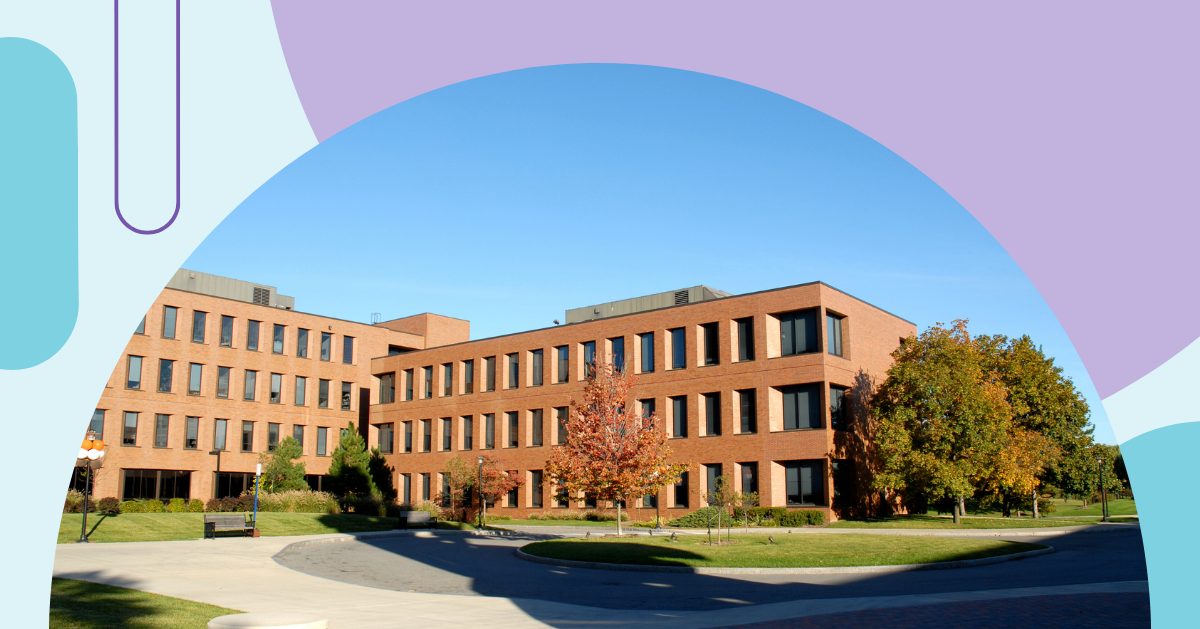
Your higher education institution’s curricula play an essential part in preparing students for job placement after graduation. Understanding the best practices for gauging the latest industry trends and learning what qualities and expertise employers are searching for in new workers can help your college or university establish the most impactful academic programs possible.
Learn how your institution can enhance each curriculum and align with the labor market’s current demands.
The importance of updating curriculum to meet current labor market needs
Refining your institution’s curriculum to meet the changing labor market is not only beneficial but necessary for adequately serving your students. Explore the key reasons why regularly updating your curriculum design is important:
Career readiness and job placement
Alignment between your college or university’s course curricula and the current labor market is integral to student employability. Employers are looking for individuals who possess the skills, competencies, and knowledge to serve their current demands. If your higher education institution does not understand the evolving industry needs, you cannot adequately prepare students to enter the workforce.
Instead, it is important to address curriculum gaps to ensure your faculty is helping students gain the insights needed to be competitive job seekers. Updating your academic programs to close a skills gap can be highly advantageous for your students, ensuring they have the technical expertise employers in their industry value.
Updating a curriculum for labor market demand helps students harness a strong understanding of current industry trends and best practices. It is one of the most impactful ways to ensure your courses are driving progress and innovation.
In today’s working world, reskilling is a common practice that allows existing employees to gain the skills necessary to support changing job demands. By emphasizing the idea of lifelong learning in curriculum design, educational institutions can prepare students to be more adaptable to evolving needs.
Institutional reputation
Tailoring curriculum design to industry demands is essential for positioning your higher education institution as innovative. The preparedness level of your graduates will directly impact your credibility and reputation as a college or university.
Overlooking the importance of getting your students job-ready can be detrimental to your efforts to attract top students who are seeking forward-thinking and proactive institutions.
By emphasizing your school’s commitment to producing well-equipped graduates who are attractive job candidates, you can enhance your reputation and give your institution a valuable competitive advantage. Updating your curriculum to meet labor market demand can also increase institutional credibility, establishing your college or university as a leader in innovation and its ability to shape prepared, skilled individuals entering the job market.
The relevance of your curricula will directly influence student retention rates and their desire to continue learning at your institution.
Educational excellence
Your higher education institution’s ability to adapt the curriculum to align with changing labor market needs impacts the quality of your academic experiences. Times are changing rapidly and your college or university must take action to avoid getting left behind. Teaching outdated or irrelevant content is a waste of time, money, and resources for students, teaching staff, and your institution at large.
If you want to deliver the highest quality education to your students, tailoring your curricula to the latest trends in the working world is essential.
By producing alumni who have the expertise to successfully compete in the job market and thrive in their post-grad jobs, your institution can also establish valuable industry recognition and respect.
How to enhance your curriculum to meet labor market demand
Your higher education institution can follow a few key steps to ensure each curriculum aligns with labor market demand and adequately prepares students for job placement after graduation. Learn more about each step below:
1. Industry research and analysis

Begin by conducting industry and market research. You can approach the industry research process with a few different strategies, such as:
- Reviewing reports: Industry and market reports offer valuable insight into the current status of the job market in a particular field and what experts project for the future.
- Connecting with industry leaders: Your institution can learn a lot from innovative industry leaders and trade associations that can speak on behalf of the job market in a specific industry.
- Reading industry publications: Dive deeper into your research by keeping up with the latest publications and news outlets. They often share information about the changing professional landscape and key considerations for the industry moving forward.
- Exploring market data: One of the most valuable and useful ways to conduct industry research is to look at labor market data. Your college or university can glean impressive insights into the current and future state of the industry, validated by data.
Labor market research is essential for identifying the skills and competencies employers are increasingly seeking from job applicants. Your higher education institution can use these insights to tailor the content of its courses to better serve students and prepare them for the working world in their respective industries.

2. Stakeholder engagement and feedback
Engaging your stakeholders is a highly advantageous step. Your stakeholders, including students, faculty, alumni, and other members of your community, can help your institution navigate curriculum development.
Reach out to your college or university alumni. They are highly valuable resources and can provide first-hand insight into their journeys to finding employment after graduation. They can help your institution understand the job market from the prospective hire’s point of view, making it easier to tailor strategies to prepare students for their careers.
Alumni can also provide insight into working for a particular industry and navigating career progression. These individuals can share their perspectives on how well your institution equipped them for their leap into the working world.
Connecting with your faculty members is especially essential because they have first-hand expertise securing work in their industries, and they often understand where their fields of study are heading. When you invite your teaching staff to help with curriculum design, you can ensure they have the tools and expertise to deliver the information in the most engaging and impactful way for students.
A collaborative approach to revising and updating your institution’s curricula can help you design more well-rounded courses.
3. Curriculum review
Institutions of higher education should assess the existing curriculum with labor market data and projections in mind. The review process should be thorough and dive into the current learning outcomes of each course. Your course objectives should make sense with the job market.
Your institution must understand how its educational programs are meeting labor market demand and where they are missing the mark. Conducting a gap analysis is a great way to identify areas in your curriculum that could use improvement and additional attention. You may find that certain content, materials, and learning outcomes remain relevant to changing industry needs while other topics or activities are outdated, extraneous, or simply less important to the success of your students.
Some of the other important facets to focus on during a curriculum review include:
- Emerging technologies: Consider what tools and technologies are becoming integral to the industry and if there are viable ways to implement them to update curriculum.
- Assessment methods: Be sure to evaluate the pertinence and effectiveness of your assessment methods in addition to course content. Are your students mastering key concepts? Would another approach increase their job readiness?
- Accreditation standards: Don’t overlook the importance of aligning your curriculum with accreditation requirements. Compliance with these standards is integral to course quality, credibility, and relevance.
4. Curriculum Mapping
In addition to a thorough overview of your course materials, curriculum mapping allows higher education institutions to establish a semester-long plan for learning. This process emphasizes that students get the information they need at the right time to optimize their understanding of core concepts, allowing them to build off of them and learn more complex, higher-level lessons.
Curriculum mapping is a collaborative process that typically involves your teaching faculty, support staff, and administrators. They work together to create the curriculum map featuring key learning goals, degree progress, and other important benchmarks throughout the student learning journey.
A curriculum map offers guidance for the sequence of lessons in a particular program and helps colleges and universities identify gaps that could impact student understanding. They also make it easier for an institution to align its program’s content with larger institutional goals and academic standards.
5. Aligned learning outcomes
By aligning your learning outcomes with job market demands, your educational institution can set students up for greater success in securing work after graduation. There are a few key elements to keep in mind when establishing these important objectives:
- Industry needs: Identifying the specific in-demand skills, knowledge, and competencies employers are seeking can help your institution choose strategic learning outcomes that are in line with labor market needs and make your students desirable job candidates.
- Confer with your curriculum map: Your academic program’s course progression will directly impact student learning and their ability to build off their existing knowledge of relevant subject matter. Your curriculum map is an incredible tool for ensuring your teaching faculty is delivering relevant content at the right times throughout the students’ learning journeys.
- Integrate soft skills: Always include learning outcomes that emphasize soft skills, such as teamwork, communication, and critical thinking. A whopping 93% of employers say soft skills play an integral role in who they choose to hire, so integrating them into your curriculum is highly advantageous for students.
- Relevant assignments: Another element to keep in mind when creating aligned learning outcomes for your curriculum is the projects, assignments, and tasks learners will participate in. Ensure you include relevant work that gives students hands-on experience in developing skills they will likely utilize in their careers.
6. Continuous improvement
The job market is always changing, and higher education institutions must take continuous action to ensure their academic programs are constantly:
- Relevant
- Effective
- Aligned with demand
Your college or university can embrace a culture of continuous improvement that is highly adaptable to changing industry needs. Through ongoing monitoring and evaluation of both your institution’s curricula and the ever-evolving labor market, you can make strategic and informed decisions to prepare students for successful post-graduate careers.
An iterative review process can help your institution evaluate and revise its curriculum regularly, ensuring learners are getting access to the latest industry trends and insights. Data is a powerful tool for continuous improvement. It is necessary to drive informed decision-making using industry insights, student feedback, and the employment outcomes of past students. By regularly collecting and analyzing this data, your college or university can identify areas for improvement within each curriculum and where your institution is excelling.

7. Professional development
Another way to enhance your curriculum to meet current industry needs is through professional development opportunities for your teaching faculty and support staff to learn more about labor market demands. They can work on gaining new or refining existing skills to serve students better. They can also explore the most up-to-date industry insights, trends, technologies, and pedagogical innovations.
Professional development is part of continuous improvement efforts across campus. In promoting these types of programs, your higher education institution can foster a faculty of adaptable lifelong learners. The more informed and prepared your teaching faculty is to deliver impactful educational experiences, the more your students will gain from their courses.
In addition to professional development opportunities for your teaching staff, consider how you can integrate these types of events into your curriculum for students. Help your students thrive by offering insight into industry best practices and what experts project for their field of study’s future.
8. Industry partnerships
Each department at your higher education institution can benefit from industry partnerships. These connections are key to bridging the gap between the classroom and the working world. You can enrich your students’ academic experiences by working with professionals who are well-versed in current labor market demands.
Industry partners will help ensure curriculum design is relevant and up-to-date on the latest advancements or shifts. Collaborating with experts, employers, or other professional organizations is an excellent way to ensure your academic programs are responsive to evolving industry requirements and needs. They can be an excellent resource for determining the readiness of students to enter the workforce, and they can shed light on ways to implement hands-on learning experiences that allow students to gain valuable first-person experience that can enhance their employability.
By teaming up with trusted industry partners, your college or university can take its curriculum design to the next level and ensure each learning program is adequately serving students and providing the latest, most relevant information and opportunities for skills development.
Leverage Watermark Curriculum Strategy to supercharge course development and catalog creation
At Watermark, we understand the challenges of managing your institution’s curricula. That’s why we’ve developed Watermark Curriculum Strategy to streamline and evolve your higher education institution’s processes. Our solutions make it easy to develop relevant, meaningful content and customize your course catalog to suit the labor market’s ever-evolving needs.
Our curriculum management software is just one part of Watermark’s Educational Impact Suite, where your college or university can drive progress from one centralized hub.
Are you interested in seeing Watermark Curriculum Strategy in action? Request a demo online to get started today!
















































































































































































































































































































































































































